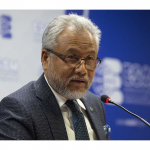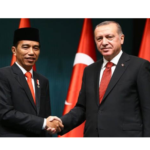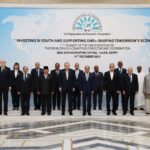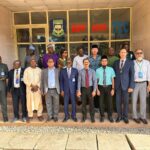
President Abdel Fattah El Sisi on Thursday gave the go-ahead for the first stage of the New El Alamein eco-city in Marsa Matrouh governorate.
The inauguration ceremony began by reciting some verses of the Holy Quran.
The president is scheduled to inspect new housing units in the city.
Nearly 5,000 residential units in the city will be poured into the market next month.
The New El Alamein city project is one of the “fourth generation” of new cities that Egypt is building. Its infrastructure will be eco-oriented. It will stretch over an area of 48,000 feddans, at a total cost of two billion pounds.
Speaking at the ceremony, Prime Minister Sherif Ismail first expressed thanks for Egyptian police and army servicemen who are fighting terrorism in central Sinai and other parts of Egypt during the “Operation Sinai 2018” upon orders from the supreme commander of the Armed Forces.
Sherif said urban planning and utilities development are on the top of the country’s priorities to alleviate citizens’ suffering, especially needy ones, and create a better life for people from all walks of life in Egypt.
The government is also keen on improving drinking water quality and developing drainage networks in villages across Egypt, Sherif said.
He said many of the goals of “Egypt Vision 2030”, especially those regarding urban planning, were achieved as the government succeeded to increase lands allocated for urban communities from 6 to 12 percent to absorb population growth.
As part of the vision, the economic growth rate increased after many major development projects were carried out and more jobs were created.
Among these major projects were the establishment of the New Administrative Capital and new models of coastal cities, including the New El Alamein eco-city and New Mansoura City.
Prime Minister Sherif Ismail said sustainable energy criteria and waste recycling are being applied in fourth-generation cities the country seeks to build where each city should have a minimum of 15 square metres of green space per person.
All services in these smart cities will be electronic and covered by the global information network in line with “Egypt Vision 2030” and the 2052 Sustainable Development Strategy, he said.
These cities will be centers for money and business entrepreneurship at national and regional levels and will offer governmental services to their inhabitants in a civilized and modern way, he added.
The government has already started establishing 15 smart cities, including the New Administrative Capital, East Port Said City, New Mansoura City, New October City, New Obour City, Hadayek October, New Toshka City, New Sheikh Zayed City, New October City, Nassar, New Mallawi and New Fashn City, he noted.
The establishment of these cities is contributing to developing the construction sector in Egypt and creating 3 million direct and indirect jobs, he said.
Speaking at the inauguration of the New El Alamein City, Prime Minister Sherif Ismail said the government is working to implement President Abdel Fattah El Sisi’s initiative to provide life insurance for large numbers of workers, especially day laborers.
Acting in cooperation with national banks and Misr Life Insurance Company, the government is implementing a new life insurance plan called “Aman” or “Security” that targets lower-income groups of society or those who do not have social security coverage, Isamil added.
Next week, the National Bank of Egypt, Banque du Caire, Banque Misr and the Principal Bank for Development and Agricultural Credit will sign a protocol with Misr Life Insurance Company to launch the first stage of this integrated project.
The new project will cover individuals in the age group of 18-59.
The new insurance plan will include certificates ranging from 500 to 2,500 pounds to be paid once.
The life insurance certificates are to be disbursed in case of natural death or accidents. Their value range from 50,000 to 250,000 pounds in case of accidental death and from 10,000 to 60,000 in case of natural death.
The beneficiaries can choose between cashing the entire amount of the life insurance all at once or receiving a monthly pension.
In case of choosing a monthly pension, the beneficiary will receive from 1,000 to 3,000 pounds on a monthly basis to be paid over a period of 5-10 years.
It should contribute to improving social and economic conditions of seasonal workers.
Following the prime minister’s word at the ceremony, a documentary, titled “Aman (security) is the right of all Egyptians”, was displayed.
The documentary provided details on “Aman” life-insurance certificates.
The documentary showed that there are 23.5 million families, including male and female day laborers and farmers, in Egypt. It noted that the number of those of these laborers who are insured is just 500,000.
The documentary also showed that 16 million persons working in the public and private sectors, representing 15 percent of the total population, enjoy social insurance coverage.
The documentary featured President Sisi’s directives to the government to provide insurance coverage for all seasonal laborers.
It also showed measures taken by the government to make “Aman” life-insurance certificates see the daylight.
For his part, Housing Minister Mostafa Madbouly said the government is working to make good use of coastal cities through establishing fully-equipped cities that contain industrial zones, services, universities and hotels.
At the goundbreaking ceremony of the first stage of the New El Alamein eco-city, Madbouly added the government has chosen the place of this city in particular, which is being built on an area of 48,000 feddans, for its distinguished location close to Cairo.
Also, it includes a 14-kilometer-long tourist walkway, he revealed.
The city can accommodate more than 3 million people, as it comprises 14 residential neighborhoods for all social classes, in addition to 8,000 feddans of industrial and logistic zones in its southernmost part, he noted.
The new city includes universities, research centers, and trade and service areas, he said.
The government started work at all new development projects, which are being built on areas of a total of 14,300 feddans, in late October 2016, the housing minister uncovered.
The Housing Ministry has already completed the building of first 500 housing units and is working on the establishment of another 5,000 units, Madbouly said.
The Housing Ministry and the Armed Forces Engineering Authority are working on the construction of 110 kilometers of roads and the building of sewage networks, rainwater drainage networks, gas and electricity networks and a major water desalination plant with a production capacity of 150,000 cubic meters, which can be expanded to produce 300,000 cubic meters for serving the entire city, he added.
The International Coastal Road, which stretches on an area of 130 kilometers with 5 “lanes” per direction in the south part of the city, will be operated to start from the gate of the New El Alamein City, Madbouly noted.
Also, the Housing Ministry and the Armed Forces Engineering Authority had dug four-meter deep lakes to allow boats get access to the city, he said.
The housing minister went on to say that three universities are being built in the city, notably Al-Alamein International University for Sciences and Technology, which can accommodate 25,000 students.
He also referred to the Arab Academy for Science Technology & Maritime Transport (AASTMT), which is being built on an area of 62,000 feddans and can accommodate 10,000 students.
The AASTMT includes a branch of the École hôtelière de Lausanne, the worlds first college in the hotel industry, to benefit from its services in promoting the New El Alamein City as a tourist destination, he noted.
A city of culture and arts, which includes the Roman Theater, studio complexes, an opera hall, a cinema complex, a mosque, a church and a museum, will be built on an area of 190 feddans, he revealed.
A tourist area comprising 20,000 hotel rooms will be built in the city, he said.
Over 200,000 square meters of buildings in the city will be finalized before the end of 2019, he noted.
The Armed Forces Engineering Authority has cooperated with the Housing Ministry to implement the states directives with regard to establishing new urban communities to cope with the high population density and provide suitable housing units for all social classes, the authoritys chairman Kamel el Wazir said.
As for the New Alamein City, el Wazir added that the authority was tasked with carrying out a network of roads and lakes, four residential areas and a water desalination plant with a production capacity of 150,000 cubic meters.
Concerning the four residential areas, he noted that the authority is working on the first phase, which includes 1,075 housing units on an area of 28 feddans, the second stage comprises 370 housing units on an area of 45 feddans, while the third phase groups 310 residential units on an area of 44 feddans, and the fourth one includes 1,800 housing units on an area of 80 feddans.
The authority is working on the establishment of one of the four biggest water desalination plants in the western part of the New Alamein City, he added.
The station is one of the 35 water desalination plants, which are being implemented nationwide to secure 392 million square meters of desalinated water by the end of this year and provide some 925 million square meters of water by the end of 2019, he noted.
The authority had discovered and defused 9,600 mines of previous wars remnants and collaborated with the General Authority for Roads, Bridges & Land Transport to construct and develop all roads leading to the city, notably the International Coastal Road, he said.
Regarding New Rafah City, el Wazir went on to say that about 535 feddans were allotted to build the city, which is expected to include 10,000 housing units and 400 Bedouin houses in addition to other facilities to serve citizens.
As for El Salam City, he stressed that the city will be set up on an area of 16,415 feddans, east of Port Said city and west of Rumanh area, saying that 9,3000 housing units are being established in the city.
With regard to underway projects in Matrouh Governorate, Governor Alaa Abu Zeid cited the project of Dabaa Nuclear plant, which is being built by the Electricity Ministry and Russias Rosatom on an area of 45 kilometers and with a production capacity of 4,800 megawatts.
The governor announced the start of the first stage of a project to develop western Egypt, which includes the establishment of Jarjob port and a global commercial hub on an area of 8,568 feddans and at a cost of USD 10 billion.
The Jarjob port is expected to contribute to strengthening Egypts regional role and boosting the worlds trade movement, as it will serve European countries and the Maghreb, which in turn help increase Cairos share in the fields of container handling and tourism industry, he added
As for the sports’ sector, Abu Zeid said the governorate is working on the establishment of new stadiums to encourage young people in the practice of sports, in addition to developing youth centers at a total cost of EGP 471 million.
With regard to museums, the governor added that Rommel’s Cave Museum was modernized at a total cost of EGP 2.5 million.
The governorate had provided all construction materials and equipment for the antiquities museum, which is slated to be inaugurated today at a cost of EGP 15 million, as it hosts 10,000 artifacts, he revealed.
A documentary on Matrouh antiquities museum was screened during the opening ceremony of the New El Alamein City, he said.
On electricity sector, Matrouh governor Alaa Abu Zeid said the subsidy to such a sector amounted to EGP 930 million, adding the power capacity jumped from 400 megawatts to 800 and is expected to reach 1,000 at the end of March.
On roads, the governor said the 90-km Siwa-Gabgob road and the 437-km Dabaa-Rod El Farag road have been accomplished while the 83km international road from Alexandria to Alameine has been also established.
On gas sector, the governor said natural gas has been supplied to more than 15,000 subscribers in Marsa Matrouh City.
On health sector, governor Abu Zeid such a sector has been developed with EGP 615 million, in addition to EGP 53 million to establish units for magnetic resonance and hepatitis C.
On education, the governor said eight faculties of Alexandria university had been inaugurated in Matrouh along with an Egyptian-Japanese school and the Dabaa nuclear school.
On investments in Matrouh, the governor said 21 investment projects worth EGP 140 billion had been launched in the governorate in three years, adding the projects cover date, olive and mineral water areas.
He said the volume of projects finance in 2014-2015 stood at EGP 405 million and jumped to more than 1 billion in 2017-2018.
On infrastructure, the governor said his governorate was keen on improving infrastructure services to meet the needs of citizens, increase investments and attract tourism.
Source: State Information Service (http://www.sis.gov.eg) (Exact Quotation)



















